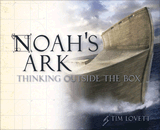
Finding Noah: An Adventure of Faith
On October 8, will moviegoers actually get the answer to the centuries-old question: have the remains of Noah’s Ark finally been found? Being released in several hundred theaters tomorrow, a new documentary and its intriguing title offer that tantalizing possibility: Finding Noah: An Adventure of Faith. Claims that the Ark (or parts of it) have been found are legion, including a well-publicized announcement by a Chinese-Turkish team in 2010 that it had found wooden sections of the Ark1 and the lingering Internet myth that on another part of Mt. Ararat a geologic formation is the long-lost Ark.2
AiG is hopeful when it hears about a new film or book that purportedly defends the historicity of the Old and New Testaments. Recent films like A Matter of Faith and Patterns of Evidence have been welcome additions. It was therefore with some hope that Finding Noah might be a movie we could endorse, especially with the world’s media covering the construction of AiG’s Noah’s Ark and in the wake of the release last year of the terrible movie Noah. AiG would like to see more film producers and ministries defend the accuracy of the biblical accounts of the Flood and Ark of Noah’s time.
Unfortunately, we found the well-intentioned Finding Noah to be disappointing on a few counts. Because many people have been asking AiG for its opinion of the film, we have posted this review in a bullet-form fashion.3
- The movie is based on a false premise. The Bible says the Ark landed on the “mountains of Ararat” (Genesis 8:4), not specifically on Mt. Ararat, as the filmmakers assert is the case with the ship’s landing spot.
- Furthermore, creationist geologists regard the thousands of feet of lavas that make up much of Mt. Ararat as Pleistocene and even Recent. That means the mountain’s volcanic eruptions occurred during the Ice Age, which happened after the Flood, and since then, even up until AD 1840. So if the Ark had landed on the precursor to modern Mt. Ararat, it would have been buried under those thousands of feet of subsequently erupted lavas and destroyed. So the question is: why even look for the Ark in a volcanic setting anyway, and why look on top of those lavas?
- There are some good, qualified people interviewed in the film. That includes Dr. Andy McIntosh, who agreed to be consulted and interviewed as someone who believes in the historicity of the global Flood and the reality of Noah’s huge ship. We have our reservations, however, about the academic qualifications of some of the people interviewed, though they might agree with us on the reality of the Flood and the Ark. More disturbingly, Dr. David Montgomery (described on the film’s website as someone who offered “expert” interviews in the film) teaches against a global Genesis Flood and is prominent in the film. His participation is a major reason we will not promote the film.4
- Another troubling aspect is the film’s interview of the mysterious “Mr. X,” who anonymously presents testimony of an intriguing object on Mt. Ararat that he connects to the Ark. It is not a credible segment by either journalistic or scholarly standards.
- The film is less about “Finding Noah” than it is the “Process of Trying to Find Noah’s Ark.” Without giving up too much of the film’s storyline, the movie has an unsatisfying ending after a very long build up that includes how the Ark explorers endured many challenges.
- Many Christians believe that if we show skeptics something like the discovery of the Ark, many non-Christians might be prompted to believe in the Bible and perhaps receive Christ. Of course, the people of Jesus’ day saw Him heal the sick and raise people from the dead, but did most of them believe? In fact, the religious leaders helped put Christ to death. Evidence like the existence of an Ark on a mountain range is not going to convince people who have already hardened their heart about the authenticity of God’s Word. Ultimately, because there is a spiritual issue involved with non-believers and Christianity (i.e., people not wanting to repent of their sins and give Christ lordship over their lives), no amount of evidence is going to change such hardened hearts.
- Over and over again in recorded history, observational science has already authenticated the Bible. Enough evidence has been compiled to show that the Bible is true for anyone to believe, even though people still clamor for more evidence yet never to satisfy. With the Ark Encounter, a full-size Ark to open late summer of next year, AiG will present the evidence that confirms the Bible. In other words, the Bible is already true, yet we can still use evidence to show people that scientific discoveries can confirm historical events that are recounted in the Word of God.
- It’s a pity that the filmmakers did not consult the world’s largest creationist group, AiG, in its production. We have several PhD scientists and a total of 360 staff, and AiG is building a world-class attraction on the Ark of Noah.
Abraham said to him, “They have Moses and the prophets; let them hear them.” And he said, “No, father Abraham; but if one goes to them from the dead, they will repent.” But he said to him, “If they do not hear Moses and the prophets, neither will they be persuaded though one rise from the dead.” (Luke 16:29–31)
Even with its faults, Finding Noah may have a redeeming quality: it will give AiG and other apologetics groups a platform to put the real, biblical Ark in front of many more people, who may turn to the Bible itself for further study.
Footnotes
- This claim has been refuted by AiG’s Dr. Andrew Snelling in “Is the Wood Recently Found on Mt. Ararat from the Ark?”
- See Dr. Snelling’s article “Special Report: Amazing ‘Ark’ Exposé.”
- Finding Noah producers kindly allowed AiG to view the film in its close-to-final stage.
- For a critique of some of Montgomery’s claims, see Dr. Terry Mortenson’s article “Basic Geology Disproves Creationism?
Recommended Resources

Answers in Genesis is an apologetics ministry, dedicated to helping Christians defend their faith and proclaim the good news of Jesus Christ.
- Customer Service 800.778.3390
- Available Monday–Friday | 9 AM–5 PM ET
- © 2026 Answers in Genesis





